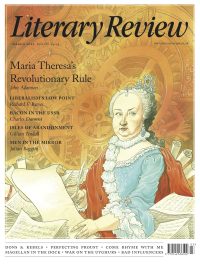Thomas Marks
Shall I Compare Thee to a Summer Pudding?
In the final chapter of her book Spices, Salt and Aromatics in the English Kitchen, Elizabeth David springs a surprise. This section, on beverages, opens with a detour to the Stuart courtier-philosopher Sir Kenelm Digby, with David arguing that Digby’s posthumously published collection of recipes, first printed in 1669, has been unjustly maligned owing to its surfeit of mead-based concoctions. ‘Were the forbidding blocks of print divided up … into verse form,’ she writes, ‘it would be seen that like all the best recipes, these are runes, litanies, something even of magic spells.’ She then breaks up Digby’s formula for one such brew, White Metheglin, into thirty-eight lines of free verse, the Carolean cocktail recipe revived as found poem: ‘when it is but blood-warm/Put in as much of the best honey/As will make the Liquor/bear an Egg the breadth of six pence above the water.’
David’s invocation of magic gestures to the residual belief that poetry, with the incantational qualities of its rhythms and repetitions, might possess an animistic force capable of charming or transforming what it addresses – in other words, that poetry makes something happen. In this context, a poem might be said to resemble a recipe, at least in so far as the enigmatic words of a spell, like a list of ingredients and cooking processes, are a set of optimistic instructions. Sorcery and the saucepan come together, remember, in the most famous literary recipe of them all: ‘Double, double, toil and trouble;/Fire burn, and cauldron bubble./Fillet of a fenny snake,/In the cauldron boil and bake’.
Beyond this, David’s versification of Digby’s recipe is suggestive of the scholarly direction that her writing had begun to take by 1970, when Spices, Salt and Aromatics in the English Kitchen appeared. She increasingly believed that the ‘quaint and uncertain rules by which our ancestors cooked’ would reveal

Sign Up to our newsletter
Receive free articles, highlights from the archive, news, details of prizes, and much more.@Lit_Review
Follow Literary Review on Twitter
Twitter Feed
Under its longest-serving editor, Graydon Carter, Vanity Fair was that rare thing – a New York society magazine that published serious journalism.
@PeterPeteryork looks at what Carter got right.
Peter York - Deluxe Editions
Peter York: Deluxe Editions - When the Going Was Good: An Editor’s Adventures During the Last Golden Age of Magazines by Graydon Carter
literaryreview.co.uk
Henry James returned to America in 1904 with three objectives: to see his brother William, to deliver a series of lectures on Balzac, and to gather material for a pair of books about modern America.
Peter Rose follows James out west.
Peter Rose - The Restless Analyst
Peter Rose: The Restless Analyst - Henry James Comes Home: Rediscovering America in the Gilded Age by Peter Brooks...
literaryreview.co.uk
Vladimir Putin served his apprenticeship in the KGB toward the end of the Cold War, a period during which Western societies were infiltrated by so-called 'illegals'.
Piers Brendon examines how the culture of Soviet spycraft shaped his thinking.
Piers Brendon - Tinker, Tailor, Sleeper, Troll
Piers Brendon: Tinker, Tailor, Sleeper, Troll - The Illegals: Russia’s Most Audacious Spies and the Plot to Infiltrate the West by Shaun Walker
literaryreview.co.uk